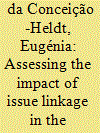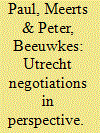|
|
|
Sort Order |
|
|
|
Items / Page
|
|
|
|
|
|
|
| Srl | Item |
| 1 |
ID:
084418


|
|
|
|
|
| Publication |
2008.
|
| Summary/Abstract |
To what extent did secrecy emerge as the uncontested norm for international negotiations after the Renaissance? This article introduces six key negotiation practitioners from 17th century Europe, including some of the earliest writers on negotiation: Hotman, Mazarini, Wicquefort, Rousseau de Chamoy, Callières, and Pecquet. An analysis of their writings demonstrates that if an ambassador had to appear in the bright light of the royal court, he became constantly preoccupied by secrecy. He needed to find ways to protect his own secrets from third parties and uncover the secrets of others. These concerns from earlier times helped to establish secrecy as the paradigm for modern negotiation
|
|
|
|
|
|
|
|
|
|
|
|
|
|
|
|
| 2 |
ID:
084428


|
|
|
|
|
| Publication |
2008.
|
| Summary/Abstract |
Although issue linkage is often an important variable in negotiations, it remains an underdeveloped research area in European integration studies. This article attempts to assess the impact of issue linkage on EU bargaining outcomes by applying the Tollison and Willett spatial model of issue linkage to a key bargaining situation in the common fisheries policy: the negotiations on the introduction of the common market organization and structural policy. This article attempts to demonstrate how deals can be completed through issue linkage packages and to identify the conditions that make issue linkage more likely.
|
|
|
|
|
|
|
|
|
|
|
|
|
|
|
|
| 3 |
ID:
084419


|
|
|
|
|
| Publication |
2008.
|
| Summary/Abstract |
In the 17th century there was no professional diplomacy: a mission as envoy or ambassador was part of a broader political or administrative career. Many politicians still neglected the importance of permanent diplomacy. Thus, there was no training, and few ambassadors had solid experience in foreign traditions and languages or in methods of diplomatic negotiations. It was rather accidental when a man from a well established Parisian family, like Claude de Mesmes, Count d'Avaux (1595-1650), served France abroad for more than 20 years. At the climax of his career, at the Congress of Westphalia, he was in many ways what we today think a good diplomat should be: open minded, smooth, compromising. In the 17th century, however, these were no criteria for the choice of an ambassador. Moreover, French governments prior to Louis XIV allowed their ambassadors to influence foreign affairs, and d'Avaux could even establish a network of his confidents in the diplomatic service. The Peace of Westphalia of 1648 was thus a result not only of governmental orders, but of a competition between d'Avaux and his rival and coambassador Abel Servien.
|
|
|
|
|
|
|
|
|
|
|
|
|
|
|
|
| 4 |
ID:
084421


|
|
|
|
|
| Publication |
2008.
|
| Summary/Abstract |
In the literature on international trade, the second half of the nineteenth century is generally characterized as one with two very different faces: trade was liberalized from 1860 until the mid-1870s and turned protectionist again thereafter. This discontinuity in the development of commercial relations goes along with much continuity regarding the domestic goals governments pursued in international trade negotiations. The French executives' primary goal was to implement their trade policy in a way that created at least as many domestic political benefits as costs. One key instrument with which the French government pursued this objective was the form of cooperation, which is an often-neglected issue in the international relations literature. The comparative analysis of two cases of French trade policy making - the Anglo-French agreement of 1860 and the Méline tariff of 1892 - will highlight how bilateral cooperation was used as an instrument to accommodate the interests of domestic economic groups having contradictory trade policy preferences. Expanding this view to the twentieth century, it can be seen that the domestic political processes of 1860 and 1892 involve many elements that are considered basic to modern trade policy-making. It can be tentatively hypothesized that trade policy-making is characterized by a common logic of balancing societal support independently of the commercial policy that is implemented and the reasons for why it is sought.
|
|
|
|
|
|
|
|
|
|
|
|
|
|
|
|
| 5 |
ID:
084415


|
|
|
|
|
| Publication |
2008.
|
| Summary/Abstract |
This article looks at the evolution of international negotiation. The practice of negotiation between sovereigns goes back at least 4,500 years. Detailed cases are found in the royal archives of Mari from the time of the Babylonian lawgiver Hammurabi and in the el-Amarna archives of the pharaohs. Though the protocol and substance of negotiation have changed over time, there is striking continuity of structure and process. Argumentation has not changed much. The study of well-documented historical examples can therefore deepen and enrich our understanding of negotiating. In modern European history we can detect, alongside recognizable and constant features of negotiation, elements that have evolved over time. We identify four features of the international system that have impacted the evolution of international negotiation in recent centuries: technological development, international regime change, growing trust and transparency, and the enhanced, autonomous role of small powers.
|
|
|
|
|
|
|
|
|
|
|
|
|
|
|
|
| 6 |
ID:
084425


|
|
|
|
|
| Publication |
2008.
|
| Summary/Abstract |
Despite the political and economic importance of the fifth European Union enlargement, not much research has been devoted to the negotiation process that led to this event. The purpose of this paper is to present the results of our survey conducted among politicians and diplomats representing the parties in the accession negotiations. The main objectives of this survey were to identify differences between the negotiating behavior and attitudes of participants and examine differences between the perceptions (self-perception vs. the perception of the negotiation partners) of the negotiating profiles. From the survey data, we gain valuable insights into the negotiation process, particularly into the parties' perceptions of selected traits, such as attitudes, interests, power, climate, team organization, communication, concern for protocol, flexibility, emotion, and time sensitivity, among negotiating profiles.
|
|
|
|
|
|
|
|
|
|
|
|
|
|
|
|
| 7 |
ID:
084423


|
|
|
|
|
| Publication |
2008.
|
| Summary/Abstract |
African societies developed a wide range of conflict management, prevention, and termination methods as a basis for the negotiation of disputes well before the arrival of colonial rule. Many of these methods are similar to those practiced elsewhere, whereas others are indigenous to Africa.
|
|
|
|
|
|
|
|
|
|
|
|
|
|
|
|
| 8 |
ID:
084416


|
|
|
|
|
| Publication |
2008.
|
| Summary/Abstract |
The Peace Negotiations in the Dutch city of Utrecht (1712-13) and its preliminaries settled the Spanish War of Succession and were used to deal with leftovers of the Westphalia Treaties. More importantly, the peace talks in Utrecht gave the major West European powers the opportunity to create an international framework enhancing stability and cooperation in Europe. The Utrecht talks are analyzed to assess the evolution of the negotiation process. The discussion enhances our understanding of international interstate negotiation processes of the past and, thereby, of the present.
|
|
|
|
|
|
|
|
|
|
|
|
|
|
|
|
|
|
|
|
|